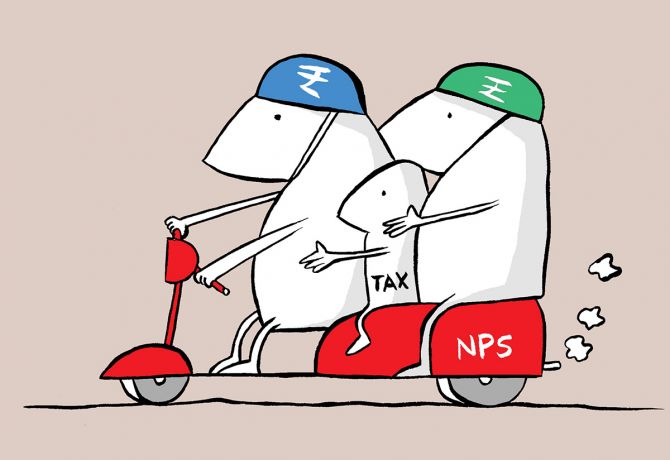Do you have income tax queries?
Please ask your questions here and rediffGURU Mihir Tanna, associate director, S K Patodia and Associates, will answer them.

Anonymous: My wife is a housewife and has no other income. To secure her future, from my salary, if I contribute every year around Rs 2 lakh into NPS tier-1 account of my wife, will there be any tax implication to her or me whenever she gets pension from NPS when she becomes 60 years old?
Upon maturity of the NPS account, you can only withdraw 60 per cent of the amount and this is entirely tax-free.
The balance 40 per cent is used to buy an annuity.
However, the annuity income is taxable as per the investor's income tax slab rate in the year of payout.
With reference to contributing to the NPS account on behalf of your spouse, the amount transferred to the spouse's NPS A/c will not be subject to tax.
However, income from the asset (amount) transferred directly or indirectly to the spouse without consideration is clubbed in the hands of the transferor. Accordingly, the tax implication would be on you (the husband) whenever your wife gets pension as annuity income (balance 40 per cent).
Madhu: My mother is housewife.
I have HRA component of Rs 60K. If I pay rent of Rs 60K to my mother, ie Rs 7.2L per year, I have to deduct TDS of Rs 36K.
Which PAN do I have to use to deduct TDS and pay the tax?
Also can my mother get the tax refund by filing ITR as she does not have any other income?
An individual paying rent of more than Rs 50k pm is required to deduct TDS using their own PAN through Form 26QC, Sec 194 IB.
The recipient of the income (owner of the property) should offer rent income to tax after deducting 30 per cent of income as a standard deduction. The taxable income is likely to be Rs 5,04,000.
For FY 23-24, if the taxable income is up to Rs 7 lakhs, tax liability under the new tax regime will be zero.
Amaresh: I had one house and two flats.
I sold one house in May 2023. I sold one flat in August 2023.
My house sale gave me a capital gain and my flat sale gave me a capital loss.
I have three questions:
1. Can I net out the capital gains by deducting the loss on sale of my flat?
2. Can I invest in a new flat for the net capital gains amount to get exempt from paying capital gains tax?
3. If answer for 2 is no, can I invest in 54EC bonds to get exemption from paying capital gains tax?
Taxable capital gain is the net amount of gain earned from all the capital assets. Thus capital gain from one capital asset can be set off against loss from another capital asset.
Section 54 provides that in case a person transfers house property and invests the gain amount in acquiring new property, capital gain will be exempt. So you can invest net capital gain in new property within the specified time limit.
The person must buy the residential house property one year before or two years from the date of such transfer of property or construct the house property within three years from the date of transfer of the property.
Anonymous: Sir, I was a NRI for last 14 years.
In June 2022 I permanently returned back to India after my job contract finished and I qualified as RNOR for FY 2022-23.
Upon returning in June 2022 I closed all my NRE FD and opened resident FD.
Is the interest earned upto June 2022 in NRE FDs are taxable as RNOR?
A person cannot avail the exemption under section 10 (4) (ii) of the Act and the NRE interest income earned for the entire year shall become taxable till the time the account is operational.
Further, the taxable interest earned from the NRE account will be eligible for deduction of up to Rs 10,000 (for savings interest only) under section 80TTA and up to INR 50,000 (for senior citizens) under section 80TTB of the Act.
Sarvothama: Dear Sir, As per rebate u/s 87A of old tax regime, Rs 12,500 tax (upto Rs 5L) is waived off. Please clarify.
An individual who is resident in India and whose total income does not exceed Rs 5,00,000 is entitled to claim rebate under section 87A. Rebate under section 87A is available in the form of deduction from the tax liability.
Rebate under section 87A will be either 100 per cent of income tax liability or Rs 12,500 -- whichever is lower.
In other words, if the tax liability exceeds Rs 12,500, rebate will be available to the extent of Rs 12,500 only and no rebate will be available if the total income (ie taxable income) exceeds Rs 5,00,000.
- You can ask rediffGURU Mihir Tanna your questions HERE.
Disclaimer: This article is meant for information purposes only. This article and information do not constitute a distribution, an endorsement, an investment advice, an offer to buy or sell or the solicitation of an offer to buy or sell any securities/schemes or any other financial products/investment products mentioned in this QnA or an attempt to influence the opinion or behaviour of the investors/recipients.
Any use of the information/any investment and investment related decisions of the investors/recipients are at their sole discretion and risk. Any advice herein is made on a general basis and does not take into account the specific investment objectives of the specific person or group of persons. Opinions expressed herein are subject to change without notice.










